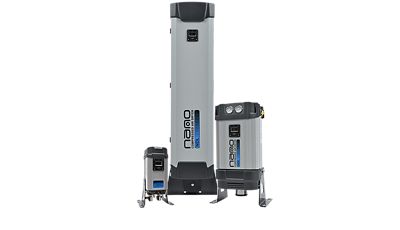Food safety is non-negotiable in the food and beverage industry. Manufacturers and processors face significant challenges in ensuring product integrity and preventing contamination. One often-overlooked factor in this equation is moisture control. Excess moisture in compressed air systems can lead to bacterial growth, product spoilage, and costly downtime.
Desiccant dryers provide an effective solution, ensuring compressed air remains dry, clean, and safe for use in food production. In this article, we’ll explore why desiccant dryers are essential for food safety, the risks of moisture in food manufacturing, and how these systems can help extend shelf life and minimise waste.
The Role of Moisture Control in Food Safety and Quality
Moisture may seem harmless, but in food production, it’s a major threat. Compressed air is widely used in food and beverage processing for everything from pneumatic conveying to bottling and packaging. If that air contains moisture, it can introduce contaminants like bacteria, mould, and yeast into the production line.
A reliable moisture control solution, such as desiccant dryers, helps ensure that compressed air remains free of harmful moisture, protecting both the product and the consumer. These systems remove water vapour from the air before it reaches critical points in production, preventing contamination and maintaining quality standards.
Why Compressed Air Systems Need Desiccant Dryers
Compressed air is an essential utility in food and beverage processing, but it’s not inherently clean. Even when ambient air appears dry, it carries moisture that condenses when compressed. If left untreated, this moisture can lead to:
- Bacterial and mould contamination
- Corrosion in pneumatic equipment
- Product degradation and shorter shelf life
- Regulatory compliance risks
Desiccant dryers address these issues by removing moisture at exceptionally low dew points, ensuring that only clean, dry air comes into contact with food and packaging.
The Risks of Moisture in Food & Beverage Production
Product Contamination
Moisture is a breeding ground for bacteria and other microorganisms. When compressed air is used in food processing—whether for packaging, mixing, or direct food contact—any moisture present can lead to contamination. Contaminated air can lead to:
Spoiled products
Increased recall risks
Compromised brand reputation
By integrating desiccant dryers, manufacturers can eliminate moisture and significantly reduce the risk of contamination.
Impact on Shelf Life and Spoilage
Moisture doesn’t just threaten food safety—it also accelerates product spoilage. In industries where product freshness is a key selling point, such as dairy, bakery, and beverage manufacturing, uncontrolled moisture can shorten shelf life, leading to:
Increased product waste
Higher operational costs
Reduced customer satisfaction
Desiccant dryers provide precise moisture control, ensuring food stays fresher for longer, reducing spoilage, and improving overall efficiency.
Regulatory Compliance and Food Safety Standards
Food manufacturers operate under strict regulatory frameworks, including FDA, USDA, and ISO standards. Many of these regulations require the use of clean, dry compressed air in production environments. Non-compliance can result in penalties, product recalls, or even facility shutdowns.
Desiccant dryers help food and beverage manufacturers meet these regulatory standards by maintaining ultra-low dew points and preventing microbial growth in compressed air systems.
How Desiccant Dryers Solve These Challenges
Removal of Moisture to Prevent Bacterial Growth
By eliminating moisture from compressed air, desiccant dryers create an inhospitable environment for bacteria and mould. Unlike refrigerated dryers, which only reduce moisture to a limited extent, desiccant dryers can achieve dew points as low as -40°C to -70°C, ensuring completely dry air.
Low Dew Points to Ensure Clean, Dry Air
A lower dew point means lower risk. Desiccant dryers remove nearly all water vapour from compressed air, significantly reducing the chance of moisture-related contamination. This is especially important in:
Powdered food processing (where moisture can cause clumping and spoilage)
Beverage production (where contamination can alter taste and quality)
Dairy processing (where even small amounts of moisture can encourage bacterial growth)
Compliance with Food-Grade Compressed Air Requirements
Food manufacturers can’t afford to take risks when it comes to air quality. Desiccant dryers help ensure compliance with industry regulations by removing water vapour, oil, and particulate contaminants from compressed air before it reaches production lines. This proactive approach helps businesses avoid compliance issues and maintain a strong reputation for quality.
Key Benefits for Food & Beverage Processors and Packagers
Minimised Downtime and Production Disruptions
Moisture-related contamination can shut down production lines, leading to significant financial losses. By investing in desiccant dryers, manufacturers can keep operations running smoothly, reducing unplanned maintenance and minimising costly downtime.
Extended Shelf Life and Improved Product Quality
Dry air helps preserve product integrity. Whether it’s keeping powdered ingredients from clumping or preventing microbial growth in bottled beverages, desiccant dryers contribute to higher-quality products with longer shelf life.
Cost Savings by Reducing Product Waste
Food waste is a major cost driver in manufacturing. Spoiled or contaminated products must be discarded, resulting in wasted ingredients, labor, and energy. By ensuring clean, dry air, desiccant dryers help reduce product loss, improve yield, and enhance profitability.
In the food and beverage industry, controlling moisture isn’t optional—it’s essential. Desiccant dryers provide a proven solution to keep compressed air clean, dry, and free from contaminants, helping manufacturers maintain food safety, extend shelf life, and reduce waste.
If you’re looking for a reliable way to protect your products and improve operational efficiency, it’s time to invest in a desiccant dryer. Contact nano-purification solutions today to learn more about our advanced air-drying technologies and how they can support your food and beverage production needs.



